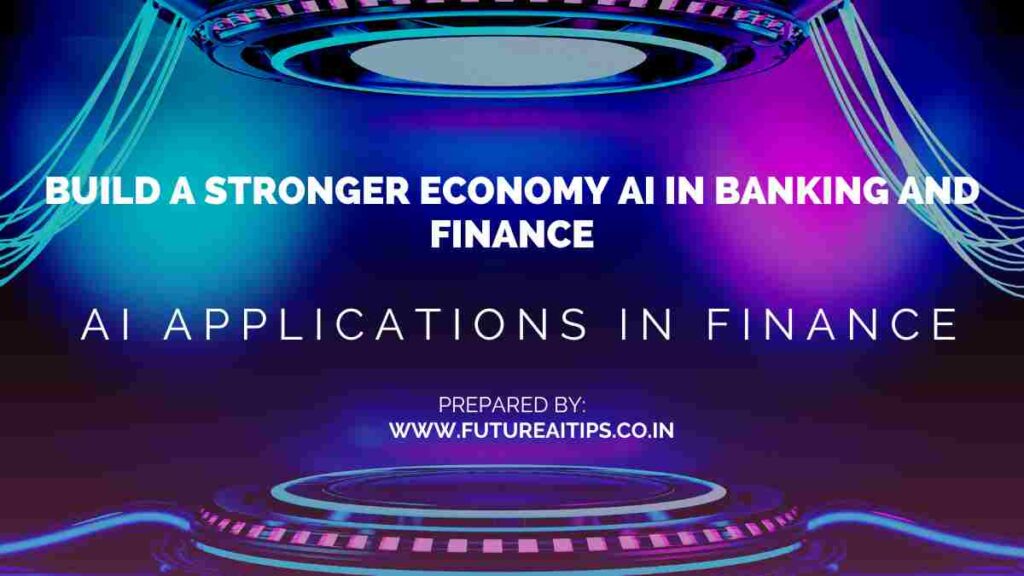Revolutionizing Finance AI in banking and finance

What is artificial intelligence in finance?
Artificial Intelligence (AI) in finance refers to the application of advanced technologies that empower financial institutions to enhance their operations and decision-making processes. It involves using AI algorithms and machine learning to derive valuable insights from vast amounts of data. In the financial sector, AI is instrumental in tasks like data analysis, predictive modeling, real-time calculations, and improving customer service.
AI systems enable financial organizations to gain a deeper understanding of market trends and customer behavior. They can process and learn from data collected during digital interactions, allowing them to engage with clients in a manner that closely resembles human intelligence, all at a large scale.
Ultimately, AI in finance aims to optimize financial strategies, reduce risks, improve investment decisions, and offer more personalized and efficient services to customers. It’s a game-changer that enables financial institutions to harness the power of data and automation to stay competitive in a rapidly evolving industry. AI in banking and finance
Here’s how AI can be applied to address these issues ai applications in finance:

- Speech Recognition: AI can transcribe spoken words into text, allowing financial institutions to gain insights from customer interactions like sales calls, leading to improved customer service. AI in banking and finance
- Sentiment Analysis: Natural language AI can determine the prevailing sentiment in text, which is useful for tasks such as assessing sentiment in investment research or analyzing sentiment in chat data. ai applications in finance AI in banking and finance
- Anomaly Detection: AI can identify unusual patterns or anomalies in financial data, aiding in the detection of fraudulent transactions, financial crimes, trading spoofing, and cyber threats. ai applications in finance
- Recommendations: AI can provide highly personalized product and service recommendations based on customer behavior, risk preferences, and financial goals, enhancing the customer experience. AI in banking and finance
- Translation: Fast and dynamic machine translation can make financial content and apps accessible to a broader, multilingual audience, improving customer interactions.
- Document Processing: AI can extract and analyze structured and unstructured data from documents, streamlining processes like loan servicing and investment opportunity discovery.
- Image Recognition: Financial institutions can use AI to analyze images and videos for tasks like expediting insurance claims processing or identity document verification.
- Conversations: AI-powered contact center experiences and virtual tools can enhance customer service, lower costs, and free up human agents’ time. These AI-driven conversations can transform personal finance management. ai applications in finance
- Data Science and Analytics: AI tools enable comprehensive data management, analytics, and machine learning, providing valuable insights for business intelligence and decision-making. AI in banking and finance
- Predictive Modeling: By utilizing customer and transaction data, AI can predict future outcomes with high precision, aiding in fraud detection, risk reduction, and predicting customer needs.
- Cybersecurity: AI can automate cybersecurity processes by continuously monitoring network traffic to detect, prevent, and respond to cyber threats effectively.
- Generative AI: AI can create new search and conversational experiences, making information more accessible and engaging for employees and customers alike.
These AI applications are revolutionizing the financial services industry, enhancing efficiency, security, and customer satisfaction while enabling better decision-making and personalized experiences.
AI brings a multitude of advantages to the financial sector:

- Automation: AI streamlines processes, making them more efficient, secure, and autonomous. This can range from automating cybersecurity tasks to providing clients with personalized digital banking experiences that are both flexible and secure.
- Accuracy: By replacing manual tasks with algorithms and automation, AI reduces the chances of human errors in various financial processes such as data processing, analytics, document handling, and customer interactions. AI in banking and finance
- Efficiency: AI takes care of repetitive tasks, freeing up human resources to concentrate on strategic activities. For instance, AI can handle document verification, call transcriptions, and basic customer queries, minimizing the need for human intervention.
- Speed: AI excels at processing vast amounts of data rapidly. It identifies patterns and relationships within data more efficiently than humans. This speed is invaluable for decision-making, risk assessment, compliance management, and more.
- Availability: AI-driven solutions enable customers to manage their finances conveniently and securely, anytime and anywhere. Cloud-based AI and machine learning systems can work continuously, ensuring uninterrupted service.
- Innovation: AI’s capacity to swiftly analyze extensive data sets sparks innovation. Financial institutions can leverage AI to create novel and competitive products and services. For instance, predictive analytics powered by AI has modernized the insurance industry, enhancing customer experiences while maintaining a human touch.
In summary, AI in finance streamlines operations, enhances accuracy, boosts efficiency, accelerates processes, ensures availability, and fuels innovation. These benefits are propelling the financial industry towards a more automated, secure, and customer-centric future. How AI can solve real challenges in financial services
AI’s Role in Shaping the Future of Financial Services

The financial services sector is on the cusp of a transformative era, driven by the integration of AI technologies. As organizations increasingly embrace digitalization and data-driven strategies, AI emerges as the linchpin for future growth. Here’s a glimpse into what lies ahead:
- Personalized Engagement at Scale: The future of financial services demands personalized customer engagement on a massive scale. AI steps in to provide tailored responses, recommend products and services with safety and accountability, and extend concierge services precisely when customers need them. AI in banking and finance
- Building Digital Customer Profiles: Creating robust, permission-based digital customer profiles is imperative. However, valuable customer data often resides in isolated silos. To overcome this challenge, financial institutions are breaking down these data barriers, integrating AI to synthesize insights, and seamlessly blending human interaction to craft unique customer experiences. ai in financial industry
AI’s role in this future is not just about automation but also about enhancing human capabilities, fostering trust, and offering unparalleled value to customers. It’s a dynamic journey that will revolutionize how financial services cater to individual needs while maintaining efficiency and security.
In conclusion
The future of AI in financial services is poised to revolutionize the industry in profound ways. As financial organizations continue their digital transformation journey, AI will be instrumental in driving growth and enhancing customer experiences. It will enable personalized engagement at an unprecedented scale, providing tailored solutions, accountable recommendations, and on-demand concierge services. ai in financial industry
Breaking down data silos and harnessing the power of AI to create comprehensive digital customer profiles will be crucial for success. This integration of AI will not only streamline processes but also elevate human capabilities, foster trust, and deliver innovative solutions.
The financial services landscape is evolving, and AI is at the forefront of this transformation, promising a future where institutions can meet the unique needs of their customers while maintaining efficiency and security. As we embrace this era of AI-driven financial services, the potential for innovation and value creation is limitless. ai in financial industry
- What is Deepfake AI | Is Deepfake legal in India

- How AI can helpful at Ram Mandir Ayodhya Safety on January 22, 2024

- How Infosys loses $1.5 billion AI contract from global customer

- What is RAG Model ? How does rag work ? Future of Technology

- What is LLM large language model | Important LLM’s in 2023

- What happens if you go on the dark web | Is dark web illegal in India 2023?











0 Comments